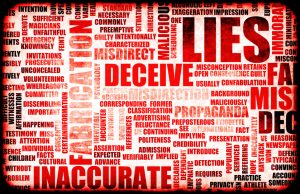The Danger When Managing The Little Lies
But testing the truth of what appears obvious is kind of what science is all about, and the latest study, conducted by researchers from University College London and Duke University, set out to test whether telling small lies really did pave the way for telling larger ones.
As they put it in the introduction to their paper:
“Many dishonest acts are speculatively traced back to a sequence of smaller transgressions that gradually escalated. From financial fraud to plagiarism, online scams and scientific misconduct, deceivers retrospectively describe how minor dishonest decisions snowballed into significant ones over time. Despite the dramatic impact of these acts on economics, policy and education, we do not have a clear understanding of how and why small transgressions may gradually lead to larger ones.”
Www.Npr.org, How Small Fibs Lead To Big Lies, Oct 24, 2016
Scientists want to understand how and why small lies lead to bigger lies. Troubled managers want to manage the little lies and hope they don’t cascade into problems they can’t … lie their way out of. Using the word “lie” is a very emotional and politically incorrect practice. However, in our attempt to be non-judgmental and not hurt anyone (as we would not want to be judged nor hurt nor be wrong in judging others), we often gloss over the typical … lie.
Doing this just desensitizes the culture of the team or organization to these little misdirections. This can, not surprisingly, cascade into an environment where the lie (say, in the form of an optimistic but totally nonobjective status report) becomes normal, especially in organizations that are not doing well and are most in need of management rigor to pull them out of their predicament.
See How To Get Honest Reporting
Increasing one’s honesty quotient in a place like this is scary, subject to being highly frowned upon, and quite possibly, if not guaranteed, to be a career limiter. However, if we really want to move the organization forward and upward, then moving to brutal honesty is pretty much required. Of course, it only seems brutal to folks who are not used to just conveying the objective facts. When I left the Air Force after 20 years, my biggest shock in the commercial world was the use of obvious and blatant lies (often to save face, but also to undermine others, etc.). Taking these organizations to more rigorous honesty often resulted in surprise (“you just want my real status?”) and often left some managers with a lot less to do when they no longer had to manage mountains of spin and misdirection.
Also see Honesty Is Just More Efficient
How well is your organization doing in avoiding or managing the little lies?
